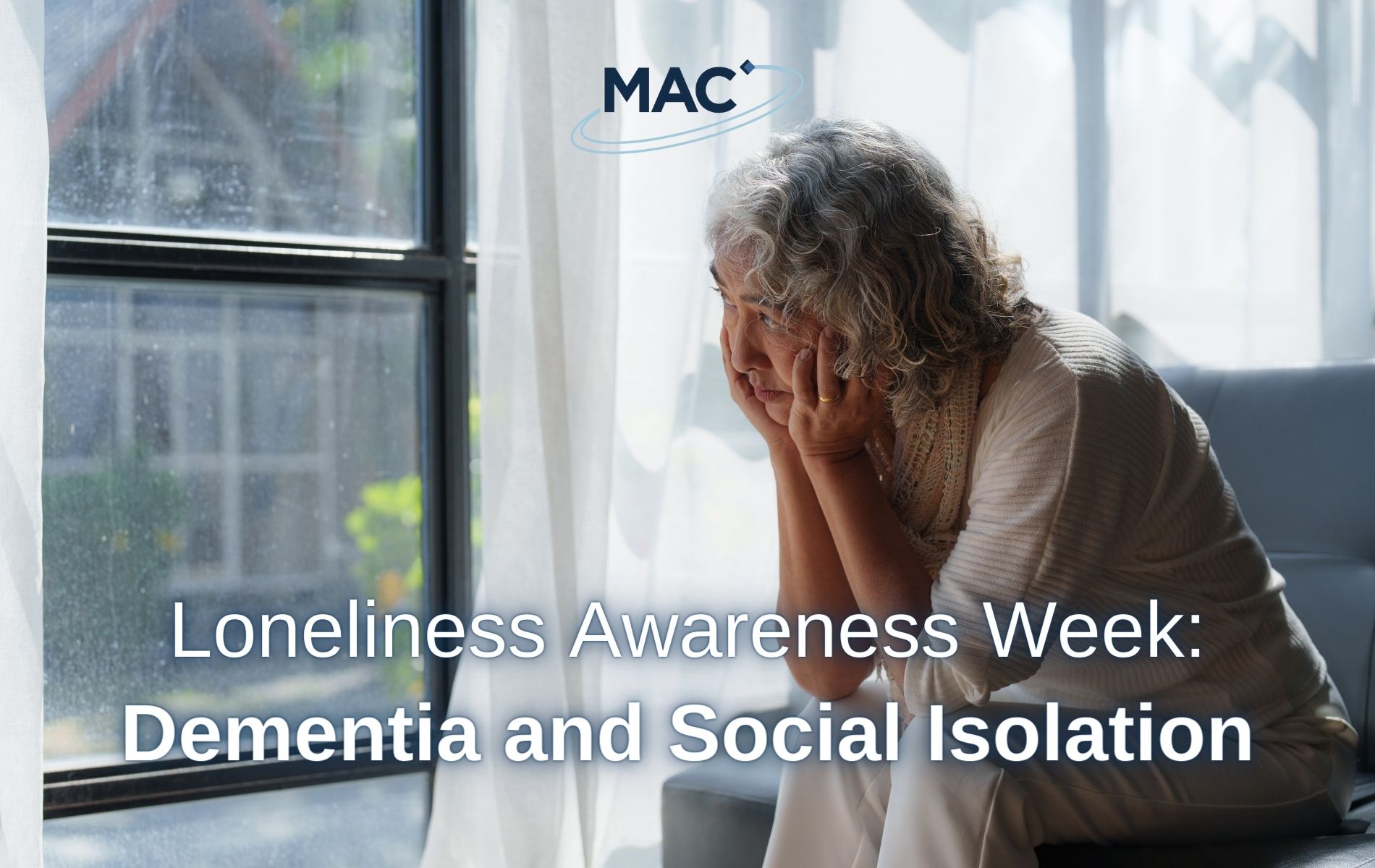As we observe Loneliness Awareness Week from 10th – 16th June, it is essential to raise awareness of a pressing and often overlooked issue: the profound link between dementia and social isolation. Both are significant public health concerns, and their intersection can have devastating effects on individuals and communities. Understanding this connection can help us develop better strategies to support those affected and foster a more compassionate society.
The Impact of Social Isolation
Social isolation is defined as a lack of social connections and can lead to loneliness, a subjective feeling of being alone. In an NHS Health survey, 22% of adults felt lonely at least some of the time, including 6% who reported that they often or always felt lonely (chronic loneliness)1. It is crucial to note, however, that one can feel lonely in a crowd or perfectly feel content in solitude.
Chronic social isolation has been linked to numerous adverse health outcomes, including increased risks of cardiovascular disease, depression, and a weakened immune system.
Social Isolation and the Elderly
For older adults, social isolation is particularly concerning. Many face life changes such as retirement, the death of loved ones, and reduced mobility, which can significantly diminish their social interactions. Without adequate social support, the risk of experiencing loneliness and its associated health problems rises sharply, with one of the main concerns being dementia.
Dementia is an umbrella term for a range of cognitive impairments that interfere with daily life. Sadly, around 900,000 people in the UK are living with dementia, with this figure projected to rise to 1.6 million by 20402. Alzheimer’s disease is the most commonly diagnosed type. Dementia affects memory, thinking, orientation, comprehension, calculation, learning capacity, language, and judgment. It is a major cause of disability and dependency among older people worldwide.
The Vicious Cycle of Dementia and Social Isolation
There is a direct relationship between dementia and social isolation. Social isolation can increase the risk of developing dementia, while dementia can lead to further social isolation.
Studies have shown that adults aged 50+ who are socially isolated have a 49–60% higher risk of developing dementia than individuals who do not experience loneliness or social isolation3.
The lack of social engagement can lead to reduced cognitive stimulation, which is crucial for brain health. Engaging in social activities, conversations, and community involvement helps maintain cognitive function and delay the onset of dementia symptoms.
On the other hand, for those already living with dementia, which is a progressive condition, individuals may withdraw from social interactions due to difficulties in communication, memory lapses, and the stigma associated with the condition. Friends and family members may also distance themselves, unsure of how to interact with someone who has dementia. This social withdrawal can exacerbate feelings of loneliness and isolation, creating a harmful cycle that further deteriorates mental and emotional health.
In a survey conducted with people living with dementia, 30.1% of people reported feeling moderately lonely and 5.2% severely lonely4.
How to Break the Loneliness Cycle
Addressing the link between dementia and social isolation requires a multifaceted approach:
- Community Programs – Develop and support programs that encourage social interaction among older adults. Community centres, clubs, and social groups can provide opportunities for meaningful engagement. Charities such as the Alzheimer’s Society have a search engine to help people find dementia support groups near them5.
- Education and Awareness – Educate the public about dementia and social isolation to reduce stigma and encourage supportive interactions. Awareness campaigns can help people understand the importance of maintaining connections with those affected by dementia.
- Support for Caregivers – Caregivers play a crucial role in the lives of those with dementia. Providing them with resources, training, and emotional support can help them maintain their own social connections and better support their loved ones.
- Technology – Leverage technology to facilitate social interactions. Virtual social platforms, video calls, and online communities can help bridge the gap for those with mobility issues or who live in remote areas.
Lonely and Worried about Memory?
Loneliness Awareness Week is an opportunity to recognise and address the profound connection between dementia and social isolation.
Did you know that MAC Clinical Research proudly provide free memory tests for over 50’s to the local communities in Lancashire, Merseyside, South Staffordshire, South Yorkshire, Teesside, and West Yorkshire.
At MAC Clinical Research, individuals attending the memory clinic can benefit from:
- An appointment within four weeks with the specialist team who are registered Dementia Friends
- Assessment and discussion of memory concerns in a relaxed friendly environment
- Explanation of the results of the assessment
- Liaison with their GP
- Ongoing memory reviews where needed
- Opportunity to access potential new treatments via clinical trials
If you are over 50 years old and have concerns about your memory, visit our Memory Assessment Research clinic’s webpage for more information and to register for a free memory test.
1 NHS England – Health Survey for England, 2021 part 2
2 Alzheimer’s Research UK – INTRODUCTION TO THE DEMENTIA STATISTICS HUB
3 Journal of Alzheimer’s Disease Reports – The Impact of Loneliness and Social Isolation on Cognitive Aging: A Narrative Review
4 International Journal of Geriatric Psychiatry – Prevalence and determinants of loneliness in people living with dementia: Findings from the IDEAL programme5 Alzheimer’s Society – Find support near you




